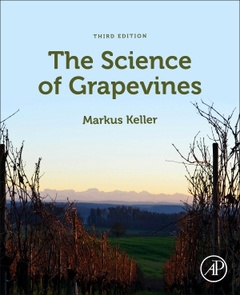Description
The Science of Grapevines (3rd Ed.)
Author: Keller Markus
Language: English
Subjects for The Science of Grapevines:
Keywords
Allocation; Anthocyanin; Aroma; ATP; Bacterium; Biotroph; Capacity; Cold hardiness; Disease resistance; Drought stress; Flavor; Fungus; Heat stress; Infection; Microclimate; NADPH; Necrotroph; Nitrogen assimilation; Nutrient deficiency; Organic acid; Partitioning; Phloem; Photorespiration; Photosynthesis; PR protein; Pressure flow; Respiration; Ripening; Rubisco; Salinity; Starch; Stilbene; Sugar; Tannin; Temperature; Toxicity; Vigor; Virus; Yield
554 p. · 19x23.3 cm · Paperback
Description
/li>Contents
/li>Readership
/li>Biography
/li>Comment
/li>
The Science of Grapevines, Third Edition reflects the latest insights into cultivar relationships, vascular transport, hormone action, and stress responses of grapevines. Based on the author?s many years of teaching, research and practical experience with grapevines and grape production, the book is completely revised and updated, presenting a comprehensive introduction on the physical structure of the grapevine, its organs, their functions, and their environmental interactions. While many concepts discussed are broadly applicable to plants in general, the focus is on grapevines, especially cultivated grapevines. This book enables readers to use these concepts in their own scientific research or in practical production systems.
Scientifically grounded and integrating discoveries in other plant species, the book explores the physiological processes underlying grapevine form and function, their developmental and environmental control, and their implications for practical vineyard management.
Vineyard and/or winery owners, growers, vineyard managers, technical viticulturists, winemakers, students, consultants, and wine journalists
- Improves user understanding of the impact of their management decisions and cultural practices
- Enables prediction of the consequences of actions in the vineyard and the diagnosis and mitigation of potential problems before they threaten the sustainability of grape production
- Includes specific insights on canopy-environment interactions, yield formation, sources of variation in fruit composition and environmental constraints




